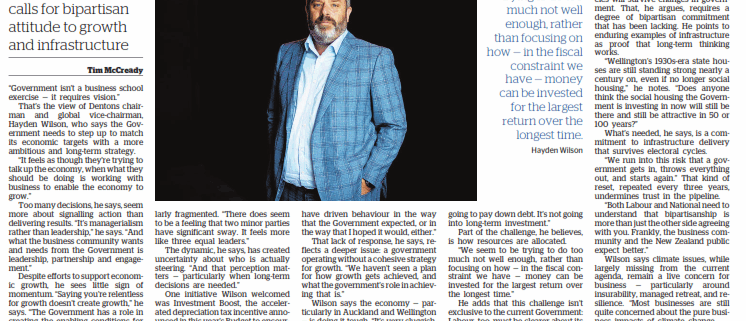Mood of the Boardroom: Why we need vision, not just visibility (NZ Herald)
Mood of the Boardroom: Why we need vision, not just visibility (NZ Herald)
“Government isn’t a business school exercise — it requires vision.”
That’s the view of Dentons chairman and global vice-chairman, Hayden Wilson, who says the Government needs to step up to match its economic targets with a more ambitious and long-term strategy.
“It feels as though they’re trying to talk up the economy, when what they should be doing is working with business to enable the economy to grow.”
Too many decisions, he says, seem more about signalling action than delivering results. “It’s managerialism rather than leadership,” he says. “And what the business community wants and needs from the Government is leadership, partnership and engagement.”
Despite efforts to support economic growth, he sees little sign of momentum. “Saying you’re relentless for growth doesn’t create growth,” he says. “The Government has a role in creating the enabling conditions for that growth to occur.”
That lack of direction is made worse, he says, by the dynamics of the Coalition Government. While coalition governments are nothing new under MMP, he believes the current government feels particularly fragmented. “There does seem to be a feeling that two minor parties have significant sway. It feels more like three equal leaders.”
The dynamic, he says, has created uncertainty about who is actually steering. “And that perception matters — particularly when long-term decisions are needed.”
One initiative Wilson welcomed was Investment Boost, the accelerated depreciation tax incentive announced in this year’s Budget to encourage businesses to invest in productive assets.
But he has observed that the policy hasn’t had the desired impact. “Businesses don’t have the confidence to make large-scale capital investments,” he says. “It doesn’t seem to have driven behaviour in the way that the Government expected, or in the way that I hoped it would, either.”
That lack of response, he says, reflects a deeper issue: a government operating without a cohesive strategy for growth. “We haven’t seen a plan for how growth gets achieved, and what the government’s role in achieving that is.”
Wilson says the economy — particularly in Auckland and Wellington — is doing it tough. “It’s very sluggish, and businesses don’t have confidence that it’s going to improve.”
He notes that even in the regions, where people are feeling the benefits of a slightly improved economy, you’d expect some of that money to be spent.
“But for a lot of people, that’s going to pay down debt. It’s not going into long-term investment.”
Part of the challenge, he believes, is how resources are allocated.
“We seem to be trying to do too much not well enough, rather than focusing on how — in the fiscal constraint we have — money can be invested for the largest return over the longest time.”
He adds that this challenge isn’t exclusive to the current Government: Labour, too, must be clearer about its agenda. “It’s not enough to oppose. Labour needs to lay out its ideas on infrastructure, accept that we have thin capitalisation, and say how it would do things differently.”
Wilson says unlocking long-term investment — especially in infrastructure and climate resilience — depends on the assurance that policies will survive changes in government. That, he argues, requires a degree of bipartisan commitment that has been lacking. He points to enduring examples of infrastructure as proof that long-term thinking works.
“Wellington’s 1930s-era state houses are still standing strong nearly a century on, even if no longer social housing,” he notes. “Does anyone think the social housing the Government is investing in now will still be there and still be attractive in 50 or 100 years?”
What’s needed, he says, is a commitment to infrastructure delivery that survives electoral cycles.
“We run into this risk that a government gets in, throws everything out, and starts again.” That kind of reset, repeated every three years, undermines trust in the pipeline.
“Both Labour and National need to understand that bipartisanship is more than just the other side agreeing with you. Frankly, the business community and the New Zealand public expect better.”
Wilson says climate issues, while largely missing from the current agenda, remain a live concern for business — particularly around insurability, managed retreat, and resilience. “Most businesses are still quite concerned about the pure business impacts of climate change.
“Those environmental and climate credentials have long helped attract people to New Zealand, and they’re quietly slipping off the radar.”
● Dentons is an advertising sponsor of the Herald’s Mood of the Boardroom report.



